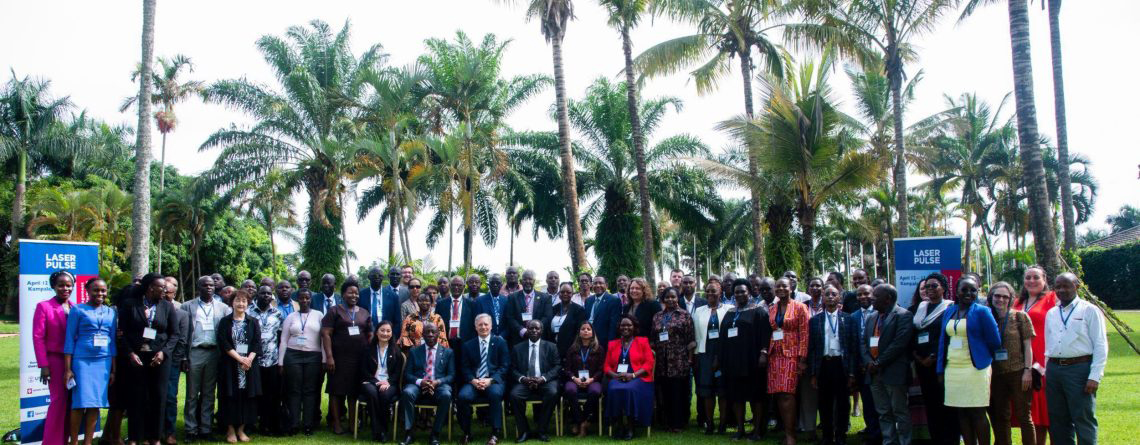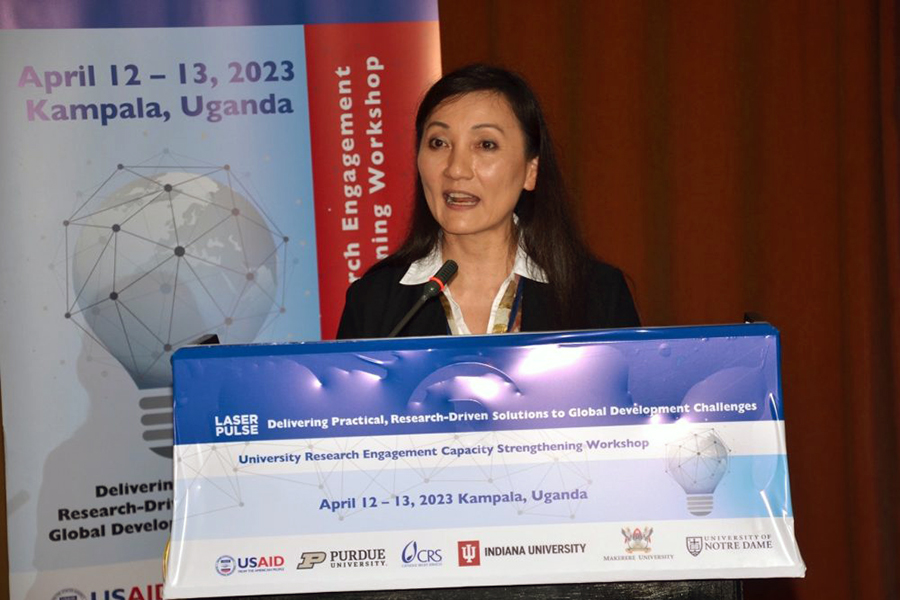LASER PULSE workshop focuses on overcoming pressing challenges in Ugandan higher ed

LASER PULSE, the global consortium led by Purdue Engineering, convened university leaders and researchers from around sub-Saharan Africa in Kampala, Uganda, on April 12-13 to continue its efforts to strengthen capacity in research leadership and project management at Higher Education Institutions (HEIs).
The University Research Engagement and Capacity Strengthening Workshop was attended by 11 sub-Saharan African countries, including DRC, Ethiopia, Ghana, Kenya, Rwanda, Somalia, South Africa, South Sudan, Tanzania, Uganda and Zambia, and focused on issues affecting HEIs in the region.
Long-term Assistance and Services for Research (LASER) Partners for University-Led Solutions Engine (PULSE) is funded by the U.S. Agency for International Development (USAID) and its Innovation, Technology and Research Hub. The consortium of university and nongovernmental partners supports USAID as it navigates developmental changes, ultimately leading to societal, environmental, educational and agricultural improvements in partner countries around the world.
The key outcomes of the April workshop included a call to action to make donors and government officials aware of the gaps and challenges that universities face in conducting efficient and effective research in development.
Participants gained key insights and skills through sessions on research leadership and project management, and overviews of LASER PULSE projects in Uganda, focusing on basic education, food and water security, and empowerment of Indigenous groups. Sessions on research leadership focused on research strategy and governance toward strengthening vibrant innovation ecosystems and effective research networks in sub-Saharan Africa. Project management sessions covered key skills in grant writing, project implementation, and finance and compliance.
In addition, attendees engaged in facilitated peer-to-peer learning in groups to work through leadership challenges and potential solutions toward transforming their own institutions’ research ecosystems. The forum also provided space for LASER PULSE to connect with researchers to learn about their challenges and integrate that learning into ongoing programming. Additionally, it facilitated an opportunity for USAID to hear about the challenges the research ecosystem is facing in the region and provide inputs on how to work together effectively.
The event closely aligned with USAID’s Higher Education Learning Agenda. Utilizing the experience of LASER PULSE and its consortium member institutions, the workshop provided a peer-learning space to strengthen research and administrative capacity of HEIs and support them in their efforts toward becoming central actors in development and further improving the use of evidence-based best practices. It sought to promote USAID’s HESN vision, strengthen higher education partnerships and transnational relationships, and encourage peer-to-peer learning and issues facing the research ecosystem.
The workshop featured high-profile opening and closing remarks with Richard Nelson, USAID/Uganda mission director, opening the event by noting 60 years of partnership between Uganda and USAID and highlighting the need for local ownership and rigorous research to inform decision making. He emphasized the importance of research in global development.
“We have achieved so many results, and most of these have been achieved and designed through research,” Nelson said.
John Chrysestom Muyingo, state minister for higher education in Uganda, closed the workshop by emphasizing the importance of applied research to the Ugandan government’s policies and programming, and how researchers can provide solutions that can be adapted.
On day two, Professor Lekan Ayo-Yusuf, head of the School of Health Systems and Public Health at the University of Pretoria and director of the RAN South Africa Resilience Innovation Lab, highlighted the key take-home messages of strengthening the research ecosystem by linking researchers across disciplines and borders, building stronger researcher relationships with donors and end users, and better incorporating early career and female researchers. He also emphasized the importance of dynamic leadership and stronger coordinating units to manage research.
“Your internal and external stakeholders should be able to provide input into your strategies… You are not innovating for yourself. You are innovating for industry or community use,” Ayo-Yusuf said.
Yuehwern Yih, professor in Purdue’s School of Industrial Engineering and co-PI and academic director of LASER PULSE, emphasized in her closing remarks the necessity of collaborative and transdisciplinary research developed through cross-sector partnerships among academic researchers, practitioners, private sector, government, and other stakeholders. She also reiterated the important role of HEIs for localization and sustainability in global development. LASER PULSE aims to apply the knowledge exchange from this workshop to inform administrative leadership of higher education institutions, USAID, and the government of the Republic of Uganda on how to structure and support the research ecosystem in higher education institutions to overcome the most pressing challenges for local communities.
Presentations shared at the workshop are available online (with passcode LASER-R4D).

